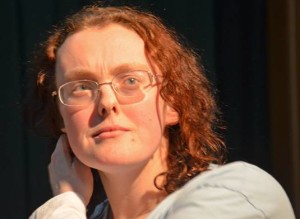“I know I have a learning disability,” said Diana Flannery, my daughter.
“I have to organize my thoughts before I speak,” said Diana, “So I stutter. Sometimes I don’t.”
“I think fine but I hear some people say, and I can hear them say it, that I’m stupid. I don’t know what to think of people like that.”
“I know I’m in good company, others deal with disabilities, and many help.”
The Good Book says to remove the obstruction from your own eye before judging another. After all, who among us is perfect, physically or otherwise? Yet intolerance abounds.
Is intolerance a moral disability?
We have more these days who understand challenges to clear speaking and thinking.
We all work around physical and stressful obstacles in our day to day living, and understand, because of that, how to be compassionate, more patient, and helpful to others with disabilities. But more need to learn what disability means and how to respond to the disabled
“I’m part of a theater group, ‘A Place to Be,’ out of Middleburg,” Diana said, “we teach others what a disability is like.”
Frank Wolf, the Congressman for the 10th Congressional District, shared his challenge to overcome the stutter he’s had since he was young.
On the House floor this past March, Frank said, “I have been a life-long stutterer.”
“Unfortunately,” Frank said, “there are no instant miracle cures for stuttering. No Surgery. No pills. No intensive weekend retreats.”
For some, a stutter may be overcome with effort but for many others, Frank said, “stuttering becomes a lifelong struggle.”
Among kids, Frank said, “for some, the teasing and the mocking can be too much.”
Frank explained, “For some people, unusual facial and bad movements may happen when they try to speak.”
I got to know John Chambers when I worked in Congress. He is the CEO of Cisco Systems, a multi-billion dollar enterprise described on the business pages as a “tech behemoth.” We traded conversation and correspondence about his disabilities years ago.
When a young man, his family moved to West Virginia, and, at 9, he was diagnosed with dyslexia, and he had a major struggle to learn. He’s said, “My teachers didn’t think I would go to college.” He earned business and law degrees. He worked for IBM and Wang before Cisco. But it didn’t become public that John suffered from dyslexia until he attended a class at his daughter’s school. A student was having trouble phrasing a question she wanted to ask because she suffered from dyslexia. Chambers said to her, “Take your time, I’m disabled too.”
Patience and effort was John’s counsel and he soon explained to the New York Times and more generally how he used voicemail, briefings and video to work around his disability.
Joseph Franklin Stephens, a Special Olympics Virginia Athlete, responded to the slurs he’d heard said about him.
“It means the rest of you are excluding us from your group,” said Joseph. “I want you to know that it hurts to be left out here, alone.”
Tim Shriver, the CEO of Special Olympics, said, “Everyone has a gift and the world would be better off if we recognized it.”
Of course, I’m Diana’s Dad but those who know Diana as friends or helped her meet her challenges talk about her empathy, her kindness, her resolve to work, her love of animals, especially horses, and of almost anyone she meets.
Every one of us has or will face a physical, mental or emotional challenge. How we treat others is how we hope to be treated ourselves.

